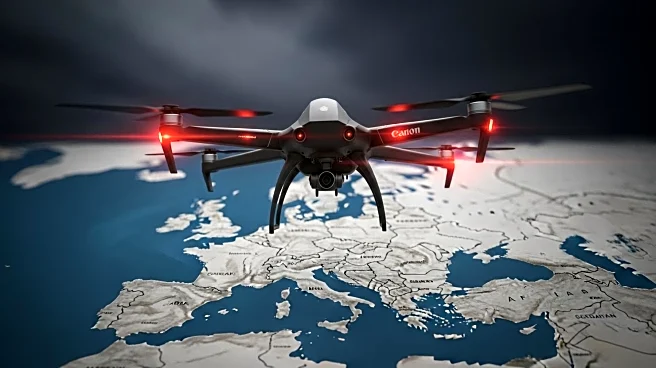What's Happening?
Recent drone incursions suspected to be orchestrated by Russia have led to significant disruptions across Europe, including the closure of Munich airport on October 2, which resulted in the cancellation of dozens of flights and stranded thousands of passengers. Similar incidents have occurred in Denmark, with Copenhagen and Aalborg airports closing due to sightings of unmanned aerial systems. These events follow a pattern of Russian drones violating Polish airspace, with three drones shot down. The incursions have heightened public anxiety, particularly in countries bordering NATO, as they suggest an escalation in Russia's alleged 'hybrid war' tactics. European leaders are grappling with how to respond to these ambiguous threats without provoking further escalation.
Why It's Important?
The drone incursions represent a significant security challenge for Europe, exposing vulnerabilities in airspace defense and raising questions about the continent's preparedness to handle such threats. The incidents have sparked debates among European leaders about the appropriate response, balancing the need for security with the risk of escalating tensions with Russia. The situation underscores the importance of unity among EU nations in addressing security threats, as public demand for protection grows. The perceived weakness in response could embolden Russia to continue its provocations, potentially destabilizing the region further.
What's Next?
European leaders are considering various measures to enhance security, including the proposal of a 'drone wall' for detection and interception, presented by Ursula von der Leyen at an EU summit. However, internal disagreements among EU members, such as Italy's concerns about neglecting southern Europe, complicate the implementation of a unified strategy. The ongoing discussions highlight the need for improved coordination and trust among European nations to effectively counter the hybrid threats posed by Russia.
Beyond the Headlines
The drone incursions are not just a military challenge but also a psychological one, aiming to disrupt and instill fear among European citizens. Experts suggest that the attacks are designed to undermine faith in authorities and liberal democracy, potentially leading to increased public support for autocratic measures. Addressing these threats requires not only military preparedness but also strategic communication to maintain public confidence and minimize panic.









